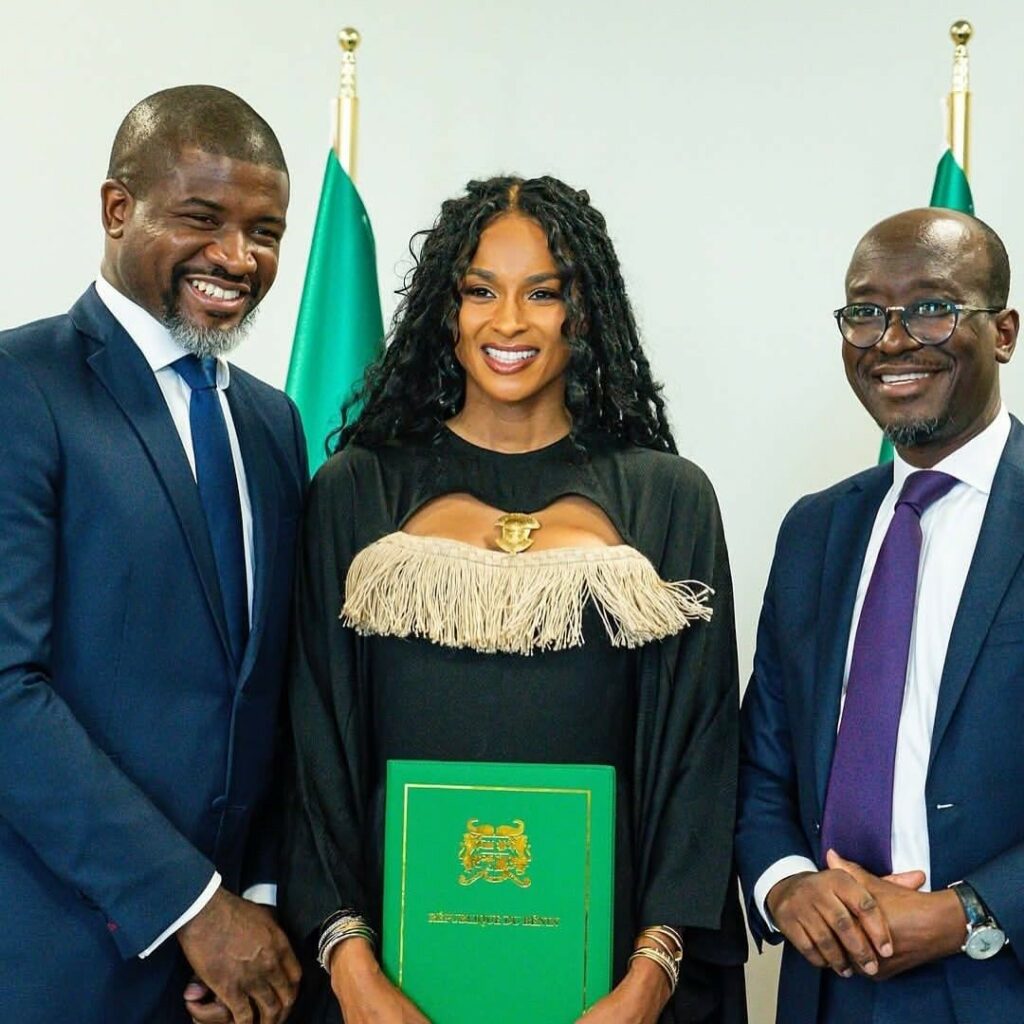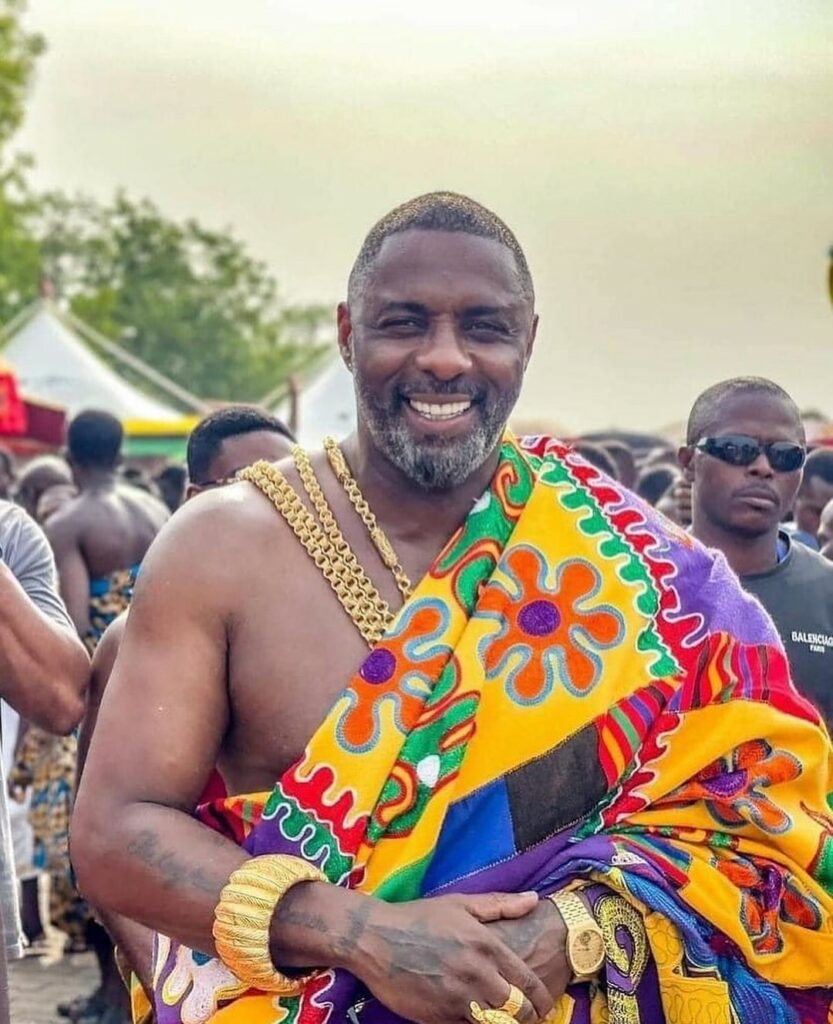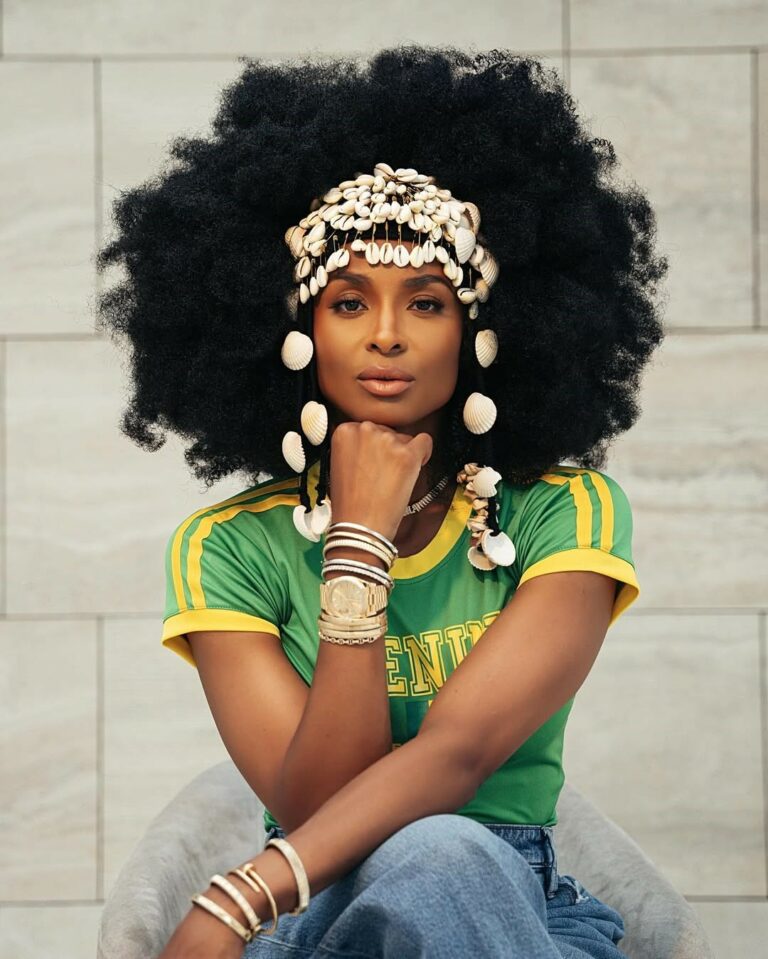Written By Dumebi Favour Ezekeke
On the 26th of July, 2025, Grammy-winning singer Ciara shocked the world again. Not with a new single or a popular dance trend, but by becoming one of the first public figures to receive citizenship in the Benin Republic. This was celebrated in a public ceremony in Cotonou and by an Instagram post where she thanked the Beninese government for “opening its arms and heart to her.”
While this news went viral, she is not the first celebrity or African American to trace their origins and find their way back to Africa. In January 2020, African American rapper and songwriter; Ludacris received citizenship in Gabon along with his mother and daughters. In May 2024, music legend Stevie Wonder also received Ghanaian citizenship from then-President Nana Akufo-Addo.
Public figures aside, Africans in the diaspora are coming back to Africa in growing numbers. Some are obtaining citizenship, while others are pursuing education and deepening their understanding of their heritage. Many are also choosing to develop or start businesses on African soil that they hope will be impactful to the next generation.
These changes stand out, especially at a time when diaspora wars on social media platforms seem to have reignited. This article looks at the reasons for this emigration, the history behind it, and why, for many people of African heritage, all roads now lead back to the motherland.
What Sparked the Mass Return?
In the year 2000, Ghana did an audacious thing.
The country passed the ‘Right of Abode’ Law. This basically meant that any person of African descent in the diaspora, could live or work in Ghana without a permit. Provided that they are contributing substantially to the country’s development. Seven years later, Ghana stretched its hands out to the diaspora again with the Joseph Project. Which commemorated 200 years since the abolition of slavery by the British Parliament and again, calling the African diaspora to return home. This event went farther than the first, but it still stayed in the shadows.
It was the Year of Return in 2019 that truly lit the match on all that the country had been trying to do since 2000. What started as a campaign mainly aimed at natural-born Ghanaians who had relocated abroad for one reason or another, spilled over to the wider diaspora and became an internet frenzy. Instagram reels of people taking videos on Ghana’s streets. Emotional videos of first-time visitors walking through the door of No Return. Celebrities like Steve Harvey going on his show to publicly discuss how he felt when he walked through the door. And influencers posting ‘before and after’ DNA results followed by their arrival into Accra, became the order of the day.
To a layman, this could’ve felt like mere tourism. But for the people of African descent, it was way deeper than that. People started looking at land, scouting for business opportunities and applying for residency. By the end of the first year, over a thousand people from the diaspora had either been granted citizenship or Right of Abode in Ghana. And, this number is predicted to increase in the coming years, because this trend of returning is simply at the beginning.
Now you may be wondering why Ghana is the core focus of this section.
The truth is that they were the first to take up the baton. Over time, other African countries joined the race in their own ways too. In East Africa, Kenya began connecting with its diaspora through investment conferences, heritage tours and programs that made it easier for Kenyans abroad to reconnect with their roots. In West Africa, Gabon made headlines in 2020 when it welcomed Ludacris and his family as citizens. Ludacris, on the other hand, seemed to take it a step further by posting viral videos on social media that showcased his daily activities and experiences with the people of Gabon. Benin Republic also opened its doors in September, 2024. By enacting the My Afro-Origins Law. Which basically grants citizenships to people who can trace their ancestry to Africans taken from the region during the trans-Atlantic slave trade. Less than a year later, this policy became more than words on paper when Ciara honored it and received a Beninese citizenship. So far, Ghana, Guinea-Bissau, and Benin Republic are the only countries in West Africa to enact such “My Afro” laws, but it is a wave that is likely to grow in the coming years.

Why is This Happening Now?
Africans on the continent often react with shock or disbelief, when they hear that people from the diaspora are choosing to return. Especially at a time when so many locals are trying to leave. For those at home, leaving often means chasing better opportunities, safety, or stability. For those abroad, coming back can mean searching for belonging, reconnecting with culture, or investing in the future here. The contrast is striking, and it shows how different experiences can shape how we see the same place.
In April 2025, Edith Kimani hosted a public debate on Deutsche Welle (DW) where Ghanaian locals openly questioned whether returnees were simply coming back because they had made enough money abroad and now saw little future there.

But for the returnees, the story couldn’t be more different. It was not about the money but the pull of belonging. That indescribable comfort of tracing your roots, reconnecting with family and being seen for who you truly are, without anything attached. Similarly, in a research on Sierra Leonean diaspora tourists, participants described how visiting their homeland eased isolation, deepened emotional ties to the land and brought psychological healing.
Steve Harvey once captured these feelings in much simpler terms: In foreign lands, he felt weighed down by race and labels. But back home, those labels slip away. ‘You’re no longer known as the “other”, you’re just yourself; walking, living and belonging”.
This proves that these changes are not just mere social media trends or FOMO. It’s a deep human urge to re-anchor identity. To stand on soil that remembers you, to build something that outlasts a vacation. Where the Africans on the continent see relocation as a means to get away and ‘hit an instant jackpot’. For many in the diaspora, the return is not just about relocation, but healing, identity, hope and the freedom to build substantial systems that could last for generations.
The Bottom Line…
There is a quiet awakening happening.
It is being driven by everything from racial burnout to political fatigue. As well as the complete exhaustion that comes from constantly trying to fit into systems or boxes that were not created for people of African descent in the first place.
Across the U.S and Europe, rising racial tensions and climbing inequalities are pushing diaspora Africans to re-evaluate the cost of raising their families and building their future in such environments. Meanwhile, Data from the Migration Data Portal shows a growing stream of reverse migration, where return is motivated by social, economic and cultural factors – all converging now. There is also an inner need for people in the diaspora to know where they are from and feel connected to their ancestors. A connection that was severed centuries ago.
This means that, to the Africans in diaspora, coming home is more than crossing borders.
It is about mending what was broken, embracing one another, and remembering that our stories are bound together no matter where we have been. It is about creating spaces where those who return are met with acceptance, trust, and the chance to help shape a shared future. If the journey back is both a personal choice and a collective opportunity, then the question becomes: when home calls, how will we answer?
REFERENCES
Associated Press. (2024, December). Benin grants citizenship to slave descendants as it faces its own role in the trade. AP News.
https://apnews.com/article/8b076652fbaac17761ff002992f2b604
Associated Press. (2025, January 3). Come home, Ghana told the African diaspora. Now some Black Americans take its citizenship. AP News.
https://apnews.com/article/f0558892453aceb2eae1a7a6e2cb276d
Associated Press. (2025, July 26). The reverse migration: African Americans relocating to Kenya cite heritage and restoration. AP News.
https://apnews.com/article/847d4aabaf334e098cd6e14936223b23
Gebauer, M., & Umscheid, M. (2021). Roots tourism and the Year of Return campaign in Ghana. In Tourism, change and the Global South (pp. 123–134).
https://www.researchgate.net/publication/350983027_Roots_tourism_and_the_Year_of_Return_campaign_in_Ghana
The Guardian. (2024, December 14). Ghana’s ‘Year of Return’ delivers a bittersweet buzz as tourists push up prices. The Guardian.
https://www.theguardian.com/world/2024/dec/14/ghana-year-return-tourists-prices-africa
Wikipedia contributors. (2025, June). Beyond the Return. In Wikipedia.
https://en.wikipedia.org/wiki/Beyond_the_Return
Wikipedia contributors. (2025, June). Ghanaian nationality law. In Wikipedia.
https://en.wikipedia.org/wiki/Ghanaian_nationality_law
Wikipedia contributors. (2025, June). Human capital flight. In Wikipedia.
https://en.wikipedia.org/wiki/Human_capital_flight
Wikipedia contributors. (2025, June). Year of Return, Ghana 2019. In Wikipedia.
https://en.wikipedia.org/wiki/Year_of_Return%2C_Ghana_2019







